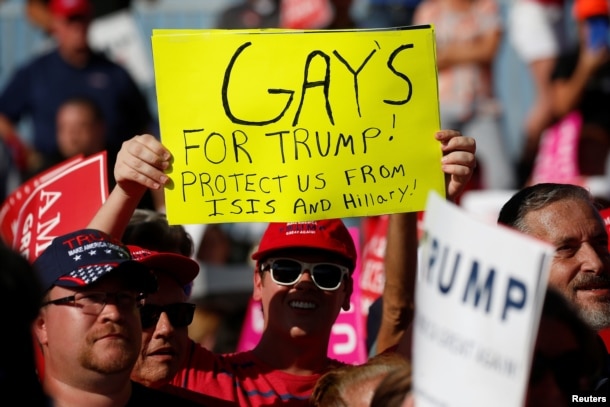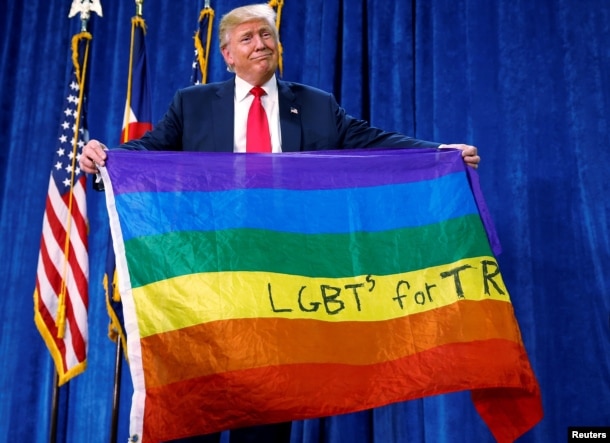Increased Anxiety on Younger LGBT Since Trump’s Election
Giovanni Guerrero says he has been "staying in more and more lately."
 The third-year aerospace engineering student at California Polytechnic State University in San Luis Obispo is both a member of the LGBT community and Mexican-American, and he feels especially vulnerable after a highly divisive election campaign that was accompanied by a rise in various types of hate crimes.
The third-year aerospace engineering student at California Polytechnic State University in San Luis Obispo is both a member of the LGBT community and Mexican-American, and he feels especially vulnerable after a highly divisive election campaign that was accompanied by a rise in various types of hate crimes.
"I mean, [living] in California is a lot safer and I'm grateful for that … [but] anti-LGBT people are very pumped now," he said.
Guerrero's anxiety is shared by many lesbian, gay, bisexual and transgender Americans, as evidenced by the Trevor Project, a nonprofit group that works to prevent suicides among LGBT youth. The project's national suicide hotline for LGBT youth received more than twice its normal call volume in the two days after the presidential election.
Trevor Project spokesman Steve Mendelsohn told VOA the crisis center received an average of 150 to 175 calls, texts or online messages a day last December. In the week following the November election this year, the number of contacts was up to 230 a day.
"There's a lot of fear out there … [and] the anxiety was heightened after the election. … They're worried they will lose their rights," Mendelsohn said.
Mendelsohn said people who contacted the hotline disclosed anxiety about their personal safety as well as fears they would be forced into conversion therapy or that laws establishing marriage equality would be reversed after Donald Trump assumes the presidency in January.

A person holds up a "Gays for Trump" sign as then-Republican presidential nominee Donald Trump holds a campaign event in Orlando, Fla., Nov. 2, 2016.
Trump's LGBT position
During his campaign, Trump vowed to appoint justices to the Supreme Court who would reverse a ruling making same-sex marriage legal in all 50 states, though he later said the current law was "settled" and he was comfortable with it. Vice President-elect Mike Pence has long been suspected by the LGBT community of supporting conversion therapy, the practice of trying to change someone's sexual orientation. In a recent New York Times interview, Pence's spokesman denied this.
The former Indiana governor supported the state's religious freedom law in 2015, which lets people and companies assert that their exercise of religion has been or is likely to be substantially burdened as a defense in legal proceedings. Critics say this permits discrimination against the LGBT community.
Gregory Angelo, president of Log Cabin Republicans — a leading group of conservatives fighting for LGBT inclusion in the Republican Party — said a lot of the fear people are experiencing stems from myths that were perpetuated by Democrats during the campaign. He said Trump was the "most pro-LGBT" Republican nominee ever.
Trump, he said, is "someone who has reached out directly to the LGBT community during his campaign and who said, and I quote, 'I will be a real friend to the LGBT community.' "
But to Guerrero, the current environment favors those who have a "dark" attitude, exemplified by a man who yelled "faggot" recently at some of his friends who were holding hands.
"It's obvious that a lot of people are more comfortable in showing their opinions, which come off as racist and homophobic," he said.
Heightened anxiety
In an online survey of primary and secondary school educators across the country, the Southern Poverty Law Center's Teaching Tolerance project contacted more than 10,000 teachers, counselors, administrators and others working with youth in schools.
Ninety percent reported that the climate in their schools had been negatively affected since the election, and most of them said they thought the impact would be long-lasting.
"There's certainly a lot of anti-LGBT harassment reported," said Maureen Costello, director of Teaching Tolerance and the study's author.
Eight in 10 educators reported heightened anxiety on the part of marginalized students, including LGBT students, immigrants, Muslims and African-Americans.
"LGBT kids, immigrants or kids perceived as immigrants are very anxious about the future and they have now suffered this harassment, and that doesn't go away," Costello said.

Then-Republican presidential nominee Donald Trump holds up a rainbow flag with "LGBTs for TRUMP" written on it at a campaign rally in Greeley, Colo., Oct. 30, 2016.
Angelo said he would not discredit anyone's personal experience, but that he thought the anxiety about the LGBT community's future under Trump was ill-founded.
"This notion that conversion therapy is going to be forced upon LGBT Americans or whether marriage equality is going to go away are not statements that Mr. Trump made during the course of his campaign and certainly are not of any policy agenda for the Trump administration," he said.
In July, Angelo described himself as "mad as hell" at the Republican Party's platform, which was drawn up during the campaign. The platform opposed marriage equality and included language affirming conversion therapy, supporting adoption agencies that deny gay couples the right to adopt, and endorsing Pence's religious freedom bill. Angelo described it as the "most anti-LGBT platform in the party's history."
But now, he said he's keeping an open mind, giving Trump and Pence a chance to lead.
"[Trump] has already condemned anyone who is bullying or harassing other people and using his election as a justification," he said.
Meanwhile, Guerrero said anxiety and fear were taking him and his friends back in time.
“I don't want to feel that I have to get used to this type of life where I'm always hiding from my personal identity," Guerrero said.
- Aline Barros
Comments